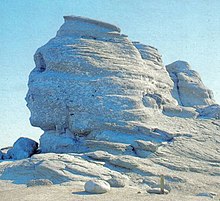The Sphinx (Romanian: Sfinxul) is a natural rock formation in the Bucegi Natural Park which is in the Bucegi Mountains of Romania. It is located at an altitude of 2,216 metres (7,270 ft) within the Babele complex of rock formations.


The first photo of the Great Bucegi Sphinx was probably taken in about the year 1900. This photograph was taken from a front position, not from a lateral one, as it usually appears in modern pictures. It only acquired its nickname, referring to the Great Sphinx of Giza, in the year 1936. The image of the sphinx appears when the rock, having an 8 m height and a 12 m width, is observed from a certain angle. The megalith has its clearest outline on 21 November, at the time the sun goes down.[1][2]
In Romanian film edit
The Sphinx features in the 1967 film The Dacians, in which it is a place of sacrifice to the god Zalmoxis. It also plays a significant role in the 1980 film Burebista, in which it is equated with the eponymous ancient Dacian king and the eternity of Romanian identity.[3]
See also edit
References edit
- ^ "Sfinxul din Muntii Bucegi". Travelworld.ro. Retrieved 13 March 2017.
- ^ Louise McTigue, ed. (2014). "Bucegi Natural Park". Nature Flip. Retrieved 17 June 2014.
Latitude: 45.382416 Longitude: 25.449116. About Bucegi Natural Park: Located in south central Romania in the Bucegi Mountains, Bucegi Natural Park covers a total area of 325 km2 (~125 sq mi). Half falls within the Dâmbovita county with the remainder split relatively equally between Prahova and Brasov. Unsurprisingly, given its location, it is a mountainous landscape with caves, canyons, sinkholes, valleys and waterfalls, alongside meadows and forests. Significant features include the Babele (Old Women) and the Sphinx.
- ^ Ciprian Plăiașu, "Mitul strămoșilor în „epopeea națională“: Dacii, Columna și Burebista", Historia, 20 December 2011